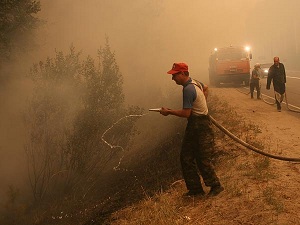Heat Waves "Almost Certainly" Due to Global Warming?
 Recent heat waves that have triggered wildfires, droughts, and heat-related deaths in the United States and around the globe “almost certainly would not have occurred” without global warming—and will become more routine in coming years, NASA climate scientist James Hansen says.
Recent heat waves that have triggered wildfires, droughts, and heat-related deaths in the United States and around the globe “almost certainly would not have occurred” without global warming—and will become more routine in coming years, NASA climate scientist James Hansen says.A new study examining six decades of global temperature data concludes that a sharp increase in the frequency of extremely hot summers can only be the result of human-caused global warming.
“We have shown … that the climate dice are now loaded—and that a new category of extreme climate events is occurring with increasing frequency,” study co-author Hansen, director of the NASA Goddard Institute for Space Studies in New York City, said in an email.
Hansen’s statements represent a marked shift from similar warnings of the past, when most climate scientists were reluctant to link an extreme weather event to warming, since such events can also occur naturally.
Often climate scientists use the analogy of loaded dice to explain the effect people are having on the climate by pumping greenhouse gases into the atmosphere: Not every roll of a loaded die will come up six—but sixes will occur more often than if the die had not been tampered with.
Hansen and colleagues now say that such analogies are no longer adequate: The loading of the climate die is now complete, and the effects are plain to see.
“Our analysis shows that it is no longer enough to say that global warming will increase the likelihood of extreme weather and to repeat the caveat that no individual weather event can be directly linked to climate change,” Hansen wrote in a Washington Post op-ed article on August 3.
“To the contrary … for the extreme hot weather of the recent past, there is virtually no explanation other than climate change.”
The new findings come on the heels of a recent about-face by Richard Muller, co-founder of the Berkley Earth Surface Temperature project and a former global warming skeptic.
In a New York Times op-ed published in late July, Muller said “it appears that essentially all of this increase results from the human emission of greenhouse gasses.”
Heat Waves on the Rise
For the new study, Hansen and his team analyzed 60 years of global temperature data and found an increase in the number of so-called 3-sigma warm-weather events, which are anomalies in summer temperatures.
In any thousand heat waves, for example, only two would be expected to reach this extreme level in the absence of global warming.
These events include the 2011 heat wave in Oklahoma, Texas, and northern Mexico; the 2010 Moscow heat wave; and very possibly the heat wave currently plaguing the U.S. Midwest, said Hansen, whose study appeared this week in the journal Proceedings of the National Academy of Sciences.
These heat waves used to be exceedingly rare, the team noted. From 1951 to 1980, extremely hot temperatures affected only one-tenth of one percent of the globe, before signs of global warming began turning up in the climate records.
But in the last three decades, extreme heat events have become more widespread and now affect about 10 percent of the globe. In another decade, the number could rise to about 17 percent.
“The odds that natural variability created these extremes are minuscule, vanishingly small. To count on those odds would be like quitting your job and playing the lottery every morning to pay the bills,” Hansen wrote in the Post.
Warming Study Makes “Dangerous” Conclusion?
Myles Allen, a climate scientist at the University of Oxford in the U.K., said the new study is “entirely reasonable and consistent with other papers that have come out over the last few years showing an increase in the risk of heat waves resulting from the overall global warming” trend.
But he took issue with Hansen and colleagues claiming that recent heat waves would not have occurred in the absence of global warming.
“It’s very dangerous, in my view, to phrase your conclusion in this way … To say in absolute terms that this weather event was very, very unlikely to occur if we hadn’t caused global warming is very difficult to substantiate with the science,” said Allen, who was not involved in the new study.
“There is obviously a link between global warming and extreme weather events, but the link has to be made through changing probabilities.”
Allen said that it’s not necessary to claim that a heat wave or wildfire would not have occurred naturally to make a strong case that global warming is real and changing the climate.
His interpretation of the new data is that “the large-scale warming that’s been observed since the 1960s—to which human influence has contributed substantially—has increased the risk of these extreme heat waves by a very substantial margin,” Allen said.
“So if the heat waves happen now, it’s been made more likely to occur … But I would never say [a particular] heat wave was extremely unlikely to occur or virtually impossible to occur in the absence of human influence.”
Clean Energy Boost Needed, Hansen Says
Study co-author Hansen said he hopes the new research will spur action to “slow, halt, and reverse global warming” and urged governments to stop subsidizing fossil fuels and collect a tax from oil companies. (Learn about global warming solutions.)
The money could then be distributed to citizens to stimulate the economy and encourage the development of clean energy, he said.
“The nations that adopt such an energy policy first will benefit by modernizing their infrastructure and having the technology to sell to the rest of the world,” he said.
You can return to the main Market News page, or press the Back button on your browser.

